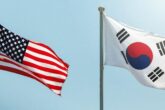November 20, 2013
Korea's Growing Security Dilemma
The Korean Peninsula remains the most dangerous flashpoint in East Asia. The decisions made in the Blue House over the next year or two may accelerate a growing security dilemma or at least dramatically ratchet up the risk.
From the vantage point of Seoul, the security environment looks increasingly risky: an unsustainable North Korean regime armed with nuclear weapons; a lack of trust with Northeast Asian neighbors investing heavily in military modernization; and a fiscally constrained United States ally transferring more responsibility, including wartime operational control (OPCON), onto the Republic of Korea. Indeed, every decision the ROK makes on defense procurement and command and control is amplified and fraught with peril. If deterrence fails, the ROK armed forces would have to lead with its forces in being.
In this highly charged and uncertain environment, North Korea’s status as the leading wild card in East Asia will continue to rise. The North is living on a knife’s edge, unwilling to back off weapons of mass destruction while keeping an oppressive Stalinist political and economic system in place. Sudden change could be triggered multiple ways, including by miscalculation (going too far one too many times with a provocation and brinkmanship) or from a coup d’etat engineered by the elite. Either way, the ROK may neither be in a position to prevent a conflict nor prosecute its swift and successful conclusion should it occur.
This week, the Center for a New American Security hosted a roundtable on this challenging environment. Retired General John Tilelli, former U.S. Forces Commander Korea, Dr. Michael O’Hanlon of the Brookings Institution, and retired Colonel David Maxwell, now at Georgetown University, and I agreed on the need for extreme caution and readiness for the high-risk years ahead.
Although Korean officials are advocating spending 3 rather than 2.5 percent of GDP on defense, money alone will not resolve the looming security threats. Procurement decisions have to be made, the diverse priorities—including fighter aircraft, missile defenses, and systems for Intelligence, Surveillance and Reconnaissance (ISR) will inevitably force Seoul to build a balanced force as cost-effectively as possible.
The F-X decision can no longer be delayed, given that the ROK Air Force is rapidly facing a huge force structure gap as it retires all of its F-4 fighters by the end of this decade. Missile defenses will have to upgraded, even though China will interpret this as a decision to further integrate with the global U.S. missile defense systems a thus pose a threat to Beijing’s security posture. ISR is essential in a high-risk environment, but a multi-layered system must be phased in gradually.
Wartime OPCON can and should be deferred, as deadlines and red lines are hazardous things in international security. At a minimum, the decision should be made when the United States and South Korea are fully prepared, and not a political timetable.
What is certain is that the decisions made by the Park Geun-hye administration are likely to have long-reaching consequences for security on and around the Korean Peninsula.
More from CNAS
-
Trump-Lee Summit
Duyeon Kim, adjunct senior fellow at the Center for a New American Security joins CNN to discuss the Trump-Lee Summit and the concerns should U.S. troops pivot to focus on Chi...
By Dr. Duyeon Kim
-
Upcoming Trump-Lee Summit: Modernizing the Alliance by First Reaffirming Long-Standing Principles
Trump and Lee could reaffirm their country’s commitment to the alliance amid shifting security dynamics and agree to modernize it in broad terms to meet the needs of today and...
By Dr. Duyeon Kim
-
South Korea-U.S. Launch Ulchi Drills as Kim Slams Exercise as “Hostile”
With North Korea's growing alignment with Moscow, plus renewed great-power diplomacy following President Trump's latest call with President Putin, the Korean Peninsula is once...
By Dr. Go Myong-Hyun
-
Indo-Pacific Security / Energy, Economics & Security
75 Years Post-Korean War: Can Trust Be Rebuilt Under the New Administration?As President Lee Jae Myung begins his term, he's taking visible steps to reset the tone with North Korea: halting propaganda broadcasts and reemphasizing past military agreeme...
By Dr. Go Myong-Hyun



